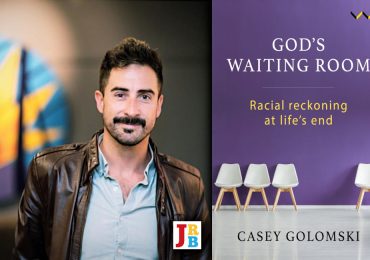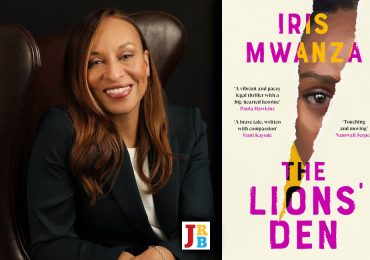Wamuwi Mbao imagines a serial adaptation of Angela Makholwa’s Black Widow Society, a sleekly executed interpretation of HJ Golakai’s The Lazarus Effect, or an HD rendering of Rahla Xenopoulos’s Bubbles.
I’ve just finished reading a book I can’t tell you about. It’s an iridescent sort of novel, historical and airtight and engaging without flaunting the research that underpins it. It’s set in the eighteen-hundreds and yet it feels indisputably modern. Too many South African novels treat the past as a grey-filtered flashback-mode world where all the furniture is conveniently arranged for the novelist to draw upon. Equally as many novels carry the unwelcome whiff of protracted labouring—and who wants the silverware if it carries the marks of the butler’s polishing? This one, fortunately, is burnished to a bright shine.
Reading it minded me to reflect that South Africa has within it many people who write well. That is, good writing appears often and plentifully enough here. In a given year, there are a number of novels which fall into this category, ‘good writing’, some of which you will read and most of which you won’t. I was recently at a well-attended book launch. The audience looked like the kind of people you expect will buy books and take them home to file lovingly away on their alphabetised bookshelves. They stood around eating cheesy things and drinking sponsored wine, and they each clutched a copy of the new volume, and each of them nodded meaningfully as writer and interlocutor muttered to each other at the front of the room. Ah, see? All those jeremiads about dwindling readership are all wrong, I thought. Look at all these avid readers, doing their part to advance the cause.
I was wrong. I was very wrong. After the launch, each of them filed past me on their way out of the door, and each of them replaced ‘their’ novel back on the new releases table. Just three of them bought copies, while the rest were presumably saving their R200 for a loaf or two of artisanal sourdough. Being an author in South Africa, then, is still often a dispiriting affair involving sordid publishing contracts and the grim horror of seeing your effort lying unread at a Hospice shop book sale.
The reason I mention all this, is that while I was reading the book I can’t (yet) mention, I kept thinking ‘this would make a lovely film’. And then I remembered television’s renaissance and I thought to myself, ‘this would make a lovely series’. Think about how many conversations you’ve had with a friend or colleague in which you exhort each other to watch this or that Netflix or HBO Original. It is odd that there seems little drive to commission and produce something similar in South Africa.
In addition to reading a book I can’t (yet) tell you about, I’ve also just finished watching a BBC series that has grossed the highest viewership numbers for the broadcaster to date. Bodyguard is a dark gasp of suspense which shoves you through six episodes and is finished before you can say ‘counter-terrorism’. It’s compelling viewing, and signals that the BBC has learned to distil the Scandi noir tone in its own content in a stylish rather than forced way. Bodyguard also works because its makers cottoned on to the idea that many people don’t have the time for eight seasons of a twelve-episode story arc. The world will end before I’ve caught up with Game of Thrones or Breaking Bad or Mad Men, but with a Beeb murder-show—The Fall, Luther, Happy Valley, Line of Duty—the portions are perfectly judged and tastefully executed.
It got me thinking: instead of toiling away writing novels that will be read by twelve people (seven of whom are circulating one copy amongst themselves), why aren’t the great and good of the literary world producing scripts that can be turned into dark and distinctive television content? Imagine how good it would have been, for instance, if instead of that aberration with John Malkovich, Disgrace was filmed as a five-episode drama with high production values? For many years now we have heard, with regular frequency, news of television rights for local books being ‘snapped up’ by international production companies, but these announcements never seem to bear any fruit. Meanwhile, fate has arranged that the national broadcaster, derelict of funding and gripped by systemic indolence these many years, and seemingly ignored by the insouciant Department of Arts and Culture, is now too moribund to sustain itself, let alone procure and fund high-quality adaptations. But in an alternate universe, wouldn’t it be fascinating to see what could be done? Imagine a serial adaptation of Angela Makholwa’s Black Widow Society, a sleekly executed interpretation of HJ Golakai’s The Lazarus Effect, or an HD rendering of Rahla Xenopoulos’s Bubbles. But such series would require the kind of attention to detail that, on the evidence of what is placed before us with enfeebling regularity, does not seem to exist in the world of mainstream South African television production.
Few industries do as much to justify the case for their extinction as the one that churns out the dreary sludge of banal soap operas, inarticulate police procedurals and duff situation comedies that make up South African small-screen viewing. You can browse government-given television at any hour and find only the horror of talk-back shows with boorish hosts gurning at each other, or the tedium of cooking and lifestyle shows whose grinning imbecilic presenters are simply clothes-horses for whatever corporate entity is keeping the lights on this week. One of the terminal crimes of South African popular culture is the belief, expressed in the kind of choices made by those who commission the programming we see on TV, that the populace are irretrievably stupid, and that being stupid, they cannot be improved by television that is not underwritten by trite messages of hope or social responsibility.
If we did make television for sentient adults, our own Mzansi noir, as it were, it would first have to get past the bowdlerising dictates of the Broadcasting Complaints Commission of South Africa, which would be no easy feat. It would also need to be produced without the usual shuckin’ and jivin’ that accrues whenever we produce something that may be viewed abroad. But the potential is there, undoubtedly, and there are many fine works to choose from, including one I can’t tell you about (yet). Imagine it: the writers would be employed, our cultural capital would increase, and people wouldn’t be so derisive about South African television. It couldn’t happen, certainly not under the current circumstances, but it’s nice to dream.
- Wamuwi Mbao is an essayist, cultural critic and academic at Stellenbosch University. Follow him on Twitter.






I think there are good and bad SA books. Even if it’s not appealing to have one’s book end in a hospice, I think it’s much better to have a book published rather than have your “book” stay a manuscript.
As for turning the works into series, I don’t think that’s realistic. One, writing and publishing is (I’m guessing), is much cheaper than making TV. Two, writing is a thing done in solitude: with movies and TV, you have to involve a whole lot of people. Three, if there was a market for it, then we would have more books turned into TV.
There certainly is a market for SA stories – problem is a lack of political and cultural will to invest in good television. Unless a ‘developing’ nation makes the necessary political/economic and cultural choices necessary to fund its own film/tv industry there will never be anything other than foreign product and really poor local product on its screens